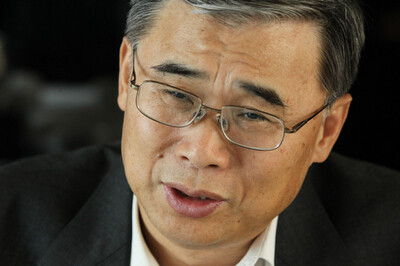hankyoreh
Links to other country sites 다른 나라 사이트 링크
New book reveals US abandoned military plans

By Lee Yong-in, staff reporter
A former National Security Council chief said the strategic flexibility agreement between South Korea and the US forced Washington to abandon military plans to use South Korea as a launching base in the event of an emergency involving Taiwan.
Lee Jong-seok, who served as NSC chief and Minister of Unification during the Roh Moo-hyun administration (2003-2008), said the US plan was ultimately changed by the insertion of a clause into the agreement preventing South Korea from being drawn into Northeast Asian conflicts.
Lee related the information in his recently published book “Peace on a Knife’s Edge,” which gives the behind-the-scenes story of his experience in policy-making under the Roh administration.
According to the book, Washington had been demanding strategic flexibility for USFK since early 2003. The aim was to allow greater ease of USFK movement from the Korean Peninsula to other regions, and vice versa, in the event of an emergency.
But while the Roh administration agreed to USFK flexibility, it also insisted that South Korea should not be drawn into any Northeast Asian conflicts. Eventually, the US effectively bowed to South Korea’s demands at a summit in Washington on June 10, 2005, at which point the strategic flexibility approach began to take shape.
A month later on July 15, then US Defense Department Deputy Undersecretary for Asia-Pacific affairs Richard Lawless admitted to Kim Sook, head of the South Korean Minister of Foreign Affairs and Trade’s North America bureau, that “readiness plans to date for an emergency involving Taiwan have presumed operations out of South Korea.”
“Now that the South Korean government has stated that it cannot accept this, the US understands and needs to change the fundamental assumptions of its readiness plan for a Taiwan emergency,” Lawless was quoted as saying at the time. This would mean that the strategic flexibility discussions resulted in changes to the role the Pentagon had assumed for USFK bases in a Taiwan emergency scenario.
Also revealed was the content of a personal letter from Roh delivered by actor and politician Moon Sung-keun when he visited North Korea in late 2003 as a special envoy.
“The crux of the issue is how quickly the nuclear issue can be resolved,” Roh wrote in the letter.
“Rather than splitting the issue down into parts and going back-and-forth as we resolve the nuclear situation and improve inter-Korean relations, we should resolve things fundamentally, generously, and comprehensively,” he recommended.
Following Moon’s visit, Pyongyang began holding more proactive discussions with Seoul on the nuclear issue, using its National Intelligence Service line to provide notice on the status and North Korean position regarding dialogue with Washington (on Dec. 9) and the results of discussions with Beijing (on Dec. 29). This marked a change from its previous refusal to discuss the nuclear issue under the framework of inter-Korean relations.
The book also reports that the so-called “Banco Delta Asia affair,” where the US designated the Macau bank as a major concern for possible laundering of North Korean money in Sept. 2005, not only prevented implementation of the six-party talks joint statement of 2005 but also resulted in a tentative agreement with Pyongyang for an inter-Korean summit being called off.
According to the book, when a North Korean delegation led by Workers’ Party of Korea secretary Kim Ki-nam visited Seoul in Aug. 2005 for an event to celebrate Korea’s liberation from Japanese occupation, Pyongyang relayed that it committed to a summit, which it describe as “something we have already determined to do.”
Please direct questions or comments to [english@hani.co.kr]

Editorial・opinion
![[Column] Season 2 of special prosecutor probe may be coming to Korea soon [Column] Season 2 of special prosecutor probe may be coming to Korea soon](https://flexible.img.hani.co.kr/flexible/normal/500/300/imgdb/original/2024/0426/3317141030699447.jpg) [Column] Season 2 of special prosecutor probe may be coming to Korea soon
[Column] Season 2 of special prosecutor probe may be coming to Korea soon![[Column] Park Geun-hye déjà vu in Yoon Suk-yeol [Column] Park Geun-hye déjà vu in Yoon Suk-yeol](https://flexible.img.hani.co.kr/flexible/normal/500/300/imgdb/original/2024/0424/651713945113788.jpg) [Column] Park Geun-hye déjà vu in Yoon Suk-yeol
[Column] Park Geun-hye déjà vu in Yoon Suk-yeol- [Editorial] New weight of N. Korea’s nuclear threats makes dialogue all the more urgent
- [Guest essay] The real reason Korea’s new right wants to dub Rhee a founding father
- [Column] ‘Choson’: Is it time we start referring to N. Korea in its own terms?
- [Editorial] Japan’s rewriting of history with Korea has gone too far
- [Column] The president’s questionable capacity for dialogue
- [Column] Are chaebol firms just pizza pies for families to divvy up as they please?
- [Column] Has Korea, too, crossed the Rubicon on China?
- [Correspondent’s column] In Japan’s alliance with US, echoes of its past alliances with UK
Most viewed articles
- 1‘We must say no’: Seoul defense chief on Korean, USFK involvement in hypothetical Taiwan crisis
- 2[Column] Season 2 of special prosecutor probe may be coming to Korea soon
- 3N. Korean delegation’s trip to Iran shows how Pyongyang is leveraging ties with Moscow
- 4Amnesty notes ‘erosion’ of freedom of expression in Korea in annual human rights report
- 5Korea sees more deaths than births for 52nd consecutive month in February
- 6[Reportage] On US campuses, student risk arrest as they call for divestment from Israel
- 7[Editorial] New weight of N. Korea’s nuclear threats makes dialogue all the more urgent
- 8‘Weddingflation’ breaks the bank for Korean couples-to-be
- 9Division commander ordered troops to enter raging flood waters before Marine died, survivor says
- 10[Editorial] Korea’s surprise Q1 growth requires objective assessment, not blind fanfare